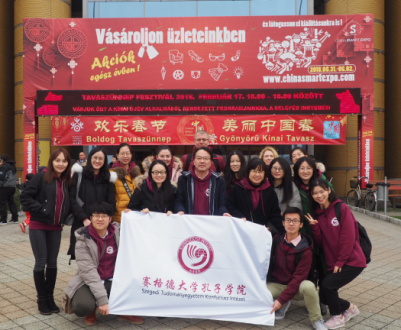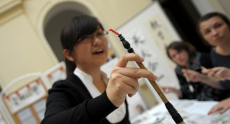University of Szeged, Konfucius Institute - Ahol tudás és szándék találkozik
 News
News
 CI NEWS ARCHIVES
CI NEWS ARCHIVES
 2018
2018
Confucius Institute at the University of Szeged Attending "Joyful Spring Festival/ Beauty of Chinese Spring" Activity in Hungary

Budapest, Feb. 17 -- The 2nd round of "Joyful Spring Festival/ Beauty of Chinese Spring" Activity was successfully held in China- Central Europe Business and Logistics Cooperation Zone in the 15th District of Budapest. The Confucius Institute at the University of Szeged participated in the event as a co-organizer. Wang Zheng, Cultural Counsellor of the Chinese embassy in Hungary, as well as Németh Angéla, deputy of the 15th district in Budapest, were present.
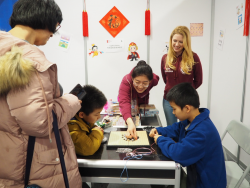 The bustling temples and wonderful performances broke the silence of the dreary winter. More than 4,000 people took part in the "Chinese Temple Fair", which contributed greatly to the festive mood of the event.
The bustling temples and wonderful performances broke the silence of the dreary winter. More than 4,000 people took part in the "Chinese Temple Fair", which contributed greatly to the festive mood of the event.
Participants could not only taste dumplings, spring rolls, rice cakes and other traditional Chinese goodies, but also have a close contact with other facets of the Chinese Culture, through practicing Chinese calligraphy, drawing Peking Opera masks and making paper-cuts. In the exhibition area of the Confucius Institute at the University of Szeged, activities involving Chinese calligraphy, Chinese knot-making, shuttlecock-kicking and backgammon-playing were zealously embraced by the participants. Detailed explanations and professional knowledge from the teachers and volunteers received high commendation from the participants.
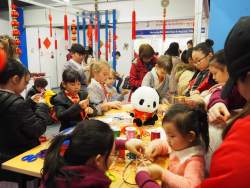 On the day of the event, both of the 1st and the 2nd floor were packed with people. Lion dance, waist drum, Han clothing dance, Peking opera, martial arts, folk music and other rich and colorful performances on the stage raised waves of cheers and applause, conveying the joy of the Chinese New Year. The activity reached its climax when Riza, a volunteer teacher from the Confucius Institute at the University of Szeged performed a spectacular Kazakhs folk dance. It was a good display of Chinese national culture, throwing the whole area into a house of a hilarious uproar.
On the day of the event, both of the 1st and the 2nd floor were packed with people. Lion dance, waist drum, Han clothing dance, Peking opera, martial arts, folk music and other rich and colorful performances on the stage raised waves of cheers and applause, conveying the joy of the Chinese New Year. The activity reached its climax when Riza, a volunteer teacher from the Confucius Institute at the University of Szeged performed a spectacular Kazakhs folk dance. It was a good display of Chinese national culture, throwing the whole area into a house of a hilarious uproar.
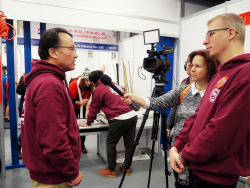 During the event, both Chinese and Hungarian directors of the Confucius Institute at the University of Szeged were interviewed by a national Hungarian television station. They both expressed their appreciation for the event, and hoped that an enhanced communication between China and Hungary would further promote the quality of Chinese language teaching and the promotion of Chinese culture in Hungary.
During the event, both Chinese and Hungarian directors of the Confucius Institute at the University of Szeged were interviewed by a national Hungarian television station. They both expressed their appreciation for the event, and hoped that an enhanced communication between China and Hungary would further promote the quality of Chinese language teaching and the promotion of Chinese culture in Hungary.
The success of the activity has brought a strong festive mood to both Chinese and local people living in Hungary, which has promoted further communications the mutual understanding of the two countries. In addition, following the introduction of the culture of Chinese food, the culture of Chinese medicine and the culture of Confucius, the culture of Chinese Spring Festival is gradually displaying its unique charm and exerting its influence all over the world.
(Qianwen Chen/Feiya Suo, volunteer teachers
from the Confucius Institute at the University of Szeged, Hungary
Edited by Lei Wang)


